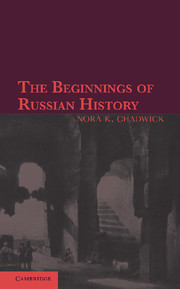Book contents
- Frontmatter
- Dedication
- Epigraph
- Contents
- Preface
- Chapter I The Early Records
- Chapter II The Early History of Kiev
- Chapter III Greek and Oriental Evidence
- Chapter IV Vladimir I
- Chapter V The Treaties with the Greeks, and Russian Heathenism
- Chapter VI Yaroslav the Wise
- Chapter VII Voevoda and Kormilets
- Chapter VIII Vladimir Monomakh
- Appendix I Extract from Ibn Miskawaih, in The Eclipse of the 'Abbasid Caliphate, Vol. v. Translated from the Arabic by D. S. Margoliouth
- Appendix II The Scandinavian Background: Oddr Víth-förli (Örvar-Oddr)
- Index
Chapter V - The Treaties with the Greeks, and Russian Heathenism
Published online by Cambridge University Press: 05 June 2016
- Frontmatter
- Dedication
- Epigraph
- Contents
- Preface
- Chapter I The Early Records
- Chapter II The Early History of Kiev
- Chapter III Greek and Oriental Evidence
- Chapter IV Vladimir I
- Chapter V The Treaties with the Greeks, and Russian Heathenism
- Chapter VI Yaroslav the Wise
- Chapter VII Voevoda and Kormilets
- Chapter VIII Vladimir Monomakh
- Appendix I Extract from Ibn Miskawaih, in The Eclipse of the 'Abbasid Caliphate, Vol. v. Translated from the Arabic by D. S. Margoliouth
- Appendix II The Scandinavian Background: Oddr Víth-förli (Örvar-Oddr)
- Index
Summary
For the compiler of the Povêst the principal event of the reign of Vladimir I is his conversion to Christianity and the official inclusion of the Russian state in the Greek Orthodox Church. In order to throw this great historical event into better perspective, great emphasis is laid on Vladimir's earlier heathenism. A few brief but unequivocal notices of his discreditable relations with women in early life are entered by the chronicler manifestly in order to bring out, by force of contrast, the importance of his later piety. But the chronicler especially deploys the material at his disposal, which gives us a full and telling picture of Vladimir's heathen idols, and of their destruction immediately after the conversion. It is probable that a part of this story had already been incorporated into some form of ‘Life of Saint Vladimir’ before the Povêst took shape, and that it had, even in its earlier form, assumed something of the lurid colouring which it sheds over the pages of the chronicle. But there can be no possible doubt that the chronicler himself or his predecessor, the author of the ‘Life’, has derived his materials for this story wholly from traditional oral saga, and that, whatever its origin, the narrative owes many of its most striking features to the oral milieu through which it has been transmitted.
The story of Vladimir's idols is curious and interesting. There are three main references to Vladimir's idolatry. The first, which may be said to be the locus classicus for early Slavonic heathenism, is perhaps even more interesting for what it tells us of the heathen sanctuary than of the gods themselves. Here (s.a. 6486-6488, i.e. A.D. 978-980) we are told that after the murder of Yaropolk, 'Vladimir began to rule alone in Kiev, and he set up idols (kumiri) on the mound (kholm) outside the building (dpor) with the terem: one of Perun, made of wood, with a head of silver and a moustache of gold, and others of Khors, Dazhbog, Stribog, Simargl and Mokosh. They sacrificed to them, calling them gods, and brought their sons and daughters to sacrifice them to demons. They polluted the earth with their sacrifice, and the Russian land and this hill were defiled with blood….Vladimir had appointed his uncle Dobrynya to rule over Novgorod.
- Type
- Chapter
- Information
- The Beginnings of Russian HistoryAn Enquiry into Sources, pp. 76 - 97Publisher: Cambridge University PressPrint publication year: 2013



